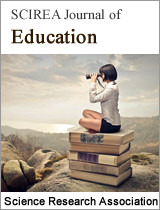Exploration of the integration of regional culture and art teaching curriculum under the flipped classroom model
DOI: 10.54647/education880521 93 Downloads 48076 Views
Author(s)
Abstract
In the context of the educationalization of artificial intelligence, the Internet has become an indispensable part of people's lifestyles today, and many educators will apply new technologies to teaching practice and promote changes in educational concepts and teaching modes. Through previous research, this study notes that the flipped classroom education model still has problems such as imperfect implementation, single teaching method, and lack of diversified characteristics in art teaching. Based on the flipped classroom model, this study combines regional cultural resources with art teaching curriculum, explores the new teaching mode of flipped classroom in art curriculum from the perspective of regional cultural resources, puts forward countermeasures to solve the problems by combining with case study and questionnaire research, and looks forward to the future research direction and trend, so as to stimulate the creativity of students and promote the development of art education curriculum system.
Keywords
flipped classroom, fine arts curriculum, regional culture, intelligent education
Cite this paper
Bing Bing Feng,
Exploration of the integration of regional culture and art teaching curriculum under the flipped classroom model
, SCIREA Journal of Education.
Volume 9, Issue 1, February 2024 | PP. 1-19.
10.54647/education880521
References
| [ 1 ] | Ministry of Education of the People's Republic of China, Art Curriculum Standards for Compulsory Education (2011 Edition) Beijing, Beijing Normal University Press, 2012 |
| [ 2 ] | Bergmann, J. and Sams, A. Flipped learning: maximizing face time. Talent Development, 2014, 28-31 . |
| [ 3 ] | Zhang Yuli. The application of flipped classroom in corporate training [D]. Shanghai International Studies University, 2017:42 |
| [ 4 ] | Li, Shiaoqin. (2018). Utilization and Effectiveness of Flipped Classroom in Primary and Secondary Art Courses. Art Education Research (22), 140. doi:CNKI:SUN:MSJY.0.2018-22-092 |
| [ 5 ] | Luo Xiaofei. Localization and Innovation--Research on Art Education Based on Regional Culture as Educational Resources[J]. Teaching and Management (Theoretical Edition),2012(10):142-144. |
| [ 6 ] | Li Zhongke. Research on the utilization of flipped classroom in college art teaching[J]. Art Technology,2021,34(24):207-209. DOI:10.3969/j.issn.1004-9436.2021.24.069. |
| [ 7 ] | Zhou Rongfang. Research on high school art appreciation classroom teaching based on "flipped classroom" model[J]. Academic Weekly,2021(13):163-164. DOI:10.16657/j.cnki.issn1673-9132.2021.13.081. |
| [ 8 ] | Ma Zhenzhao. Research on the practice of flipped classroom in high school art class--Taking photography course as an example [D]. Jiangsu:Yangzhou University,2021. |
| [ 9 ] | Hu Guojie. Research on blended teaching mode of flipped classroom based on deep learning[J]. Journal of Liaoning University of Technology (Social Science Edition),2023,25(1):116-118. DOI:10.15916/j.issn1674-327x.2023.01.030. |
| [ 10 ] | WU Zhiwei,ZHOU Geng,PAN Chen. Task-driven flipped classroom teaching practice based on deep learning[J]. Laboratory Research and Exploration,2023,42(2):288-293. DOI:10.19927/j.cn ki.syyt.2023.02.059. |
| [ 11 ] | Zhu Ke. Research on the practical application of flipped classroom in the teaching of art appreciation course in colleges and universities[J]. Popular Literature and Art,2022(5):161-163. DOI:10.3969/j.issn.1007-5828.2022.05.068. |

